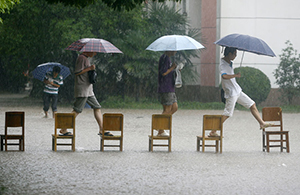Japan sets alarm bells ringing
By Wu Jinan (China Daily) Updated: 2012-12-11 07:50The international community should heed the warning and take steps to prevent Japan from shifting further to the right. Perhaps the most effective way to do so is to mobilize Japanese people to expose and eliminate the "evil forces" that are trying to turn back the clock of reason.
In the 1930s, the impact of the Great Depression caused the Japanese economy to shrink, creating conditions for rightist elements to scramble for power and wealth. The fact that Japan was controlled by a belligerent military turned the country into an aggressive and invading warmonger. The bitter lessons of those years should not be lost on far-sighted Japanese people.
At a time when rightwing forces are rising in Japan again, remembering the horrors of the Nanjing Massacre is of special importance. It is equally important to remind the world of the kind of tragedy that ignoring Japanese rightwing forces could unleash. The mass murder and rape of Chinese in the six weeks following the Japanese occupation of Nanjing on Dec 13, 1937, was one of the worst acts of war crimes in history. The Japanese troops actually killed more than 300,000 Chinese people.
The Japanese invasion of China brought untold sufferings to the Chinese people. Japanese people, too, suffered the horrors of war, because to hasten Japan's surrender, the US dropped atomic bombs on Hiroshima and Nagasaki, which killed about 300,000 people.
So when Japanese rightwing politicians clamor to amend Japan's pacifist constitution, re-establish a "national defense force" and call for a nuclear-armed Japan, the Japanese public should recall the horrors of the country's militarist past.
Japanese leaders' attempts to challenge the post-war international order have created intense frictions with almost all its neighbors. But ignoring that, the US wants to make Japan a strategic strong point - for which it offers Tokyo some security commitments under the Japan-US alliance - to carry out its strategic rebalancing in the Asia-Pacific region. The fact is that if Japan enters into conflicts with all its neighbors the US may not be willing to bear this strategic burden.
Besides, if Japan really embarks on the road of militarism, it will pose a threat to not only China and other Asian countries, but also the US.
History tells us that China and Japan have gained from good bilateral relations. Though strained bilateral relations are not good for either country, Japan will suffer more because it is more dependent on China. Hopefully, Japanese rightists will be swept away by the tide of Japanese people's rational and pragmatic demands of peace, stability and mutual prosperity.
The author is a researcher with the Shanghai Institutes for International Studies.
(China Daily 12/11/2012 page9)












